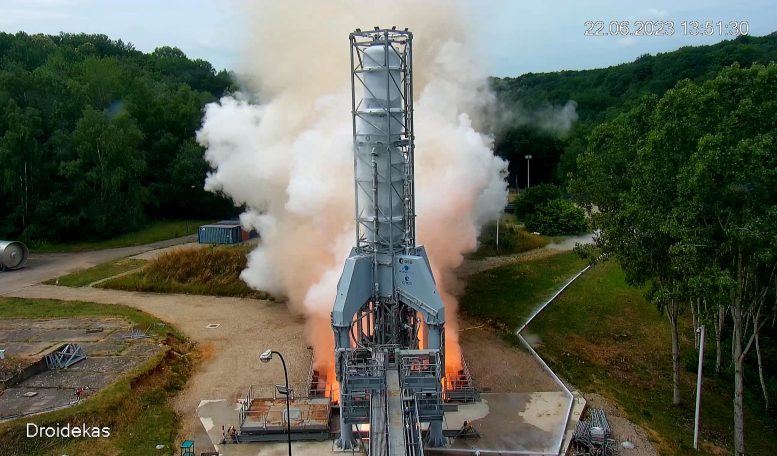
Prometheus full ignition, ArianeGroup test center in Vernon, France on June 22, 2023. The Prometheus engine, designed with a thrust capacity of 100 tonnes, uses innovative materials and manufacturing techniques such as 3D printing to cut its costs down to one-tenth of its predecessor, the Ariane 5’s Vulcain 2. Prometheus operates on a clean-burning, liquid oxygen-liquid methane fuel to simplify handling and enhance reusability. Furthermore, the engine is mounted on a reusable rocket stage prototype, Themis, and will undergo a series of hop-tests to evaluate flight and landing capabilities. Credit: ArianeGroup
Progressing with the development of reusable European rockets, ArianeGroup successfully tested Prometheus, a 100-tonne thrust class engine that uses liquid oxygen-liquid methane fuel and 3D printing for cost-effective, clean, and reusable operations. Mounted on a prototype reusable rocket stage, Themis, the engine is set for further tests to assess flight and landing capabilities and is expected to be a central element in future European launchers.
Work to develop a reusable engine for European rockets is progressing, with full ignition of an early prototype of Prometheus. These images were taken on June 22, 2023, at ArianeGroup’s test facility in Vernon, France during a 12-second burn.
The 100-tonne thrust class Prometheus features extensive use of new materials and manufacturing techniques designed to reduce its cost to just a tenth of Ariane 5’s Vulcain 2, an upgraded version of which – Vulcain 2.1 – powers the core stage of Ariane 6.
Prometheus burns liquid oxygen-liquid methane fuel. Methane is clean burning and simplifies handling, to help enable reusability and reduce the cost of ground operations before and after flight.
Prometheus features variable thrust and multiple ignition capabilities. Additive layer manufacturing – so-called 3D printing – features extensively, reducing the number of parts, speeding up production, and reducing waste.
For the Vernon and Lampoldshausen tests, Prometheus is mounted in a prototype of a reusable rocket stage, called Themis, which is being developed in parallel with the engine. Later, this engine-stage combination will attempt a series of “hop-tests,” lifting a few meters above the ground to check flight and landing capability.
Together, Prometheus and Themis are envisioned to be common technological building blocks for a future family of European launchers.









What a rubbish headline.
Igniting the future of reusable rockets …. You dumb f***s, spacex beat everyone to the punch. End of.
Give Elon the credit he deserves.
The only currently available reusable rockets courtesy of Musk.
Not Bezos, or rocket lab or any of the government agencies.
Musk and musk along done it and proved the concept. 10 fucking years ago. That’s a decade for any ret***s that can’t count.
It seems that if the Americans did something good already, we Europeans are to ignore it? Pretend it doesn’t exist? Understood. Carry on.
I have reservations about the article or blog titled “Prometheus Ignites: Future of Space Travel With Reusable Rockets” by the European Space Agency (ESA) published on June 30, 2023. Firstly, it fails to acknowledge the existing successful reusable rocket technologies employed by companies such as SpaceX and Blue Origin. These companies have clearly demonstrated the viability and economic benefits of reusability. Ignoring their contributions creates a misleading impression that the European Space Agency is a pioneer in this field, which is far from accurate. It is important to acknowledge and credit the efforts of SpaceX, who have played a crucial role in driving the entire rocketry and space industry towards sustainable and reusable rocket technology.
In order to provide a comprehensive and balanced perspective, the article or blog should have acknowledged the significant achievements made by SpaceX and Blue Origin in the realm of reusable rockets. These companies have made remarkable progress, not only in developing reusable launch vehicles but also in successfully landing and relaunching them. Their breakthroughs have paved the way for a paradigm shift in space travel and have inspired other organizations, including the European Space Agency, to explore similar concepts. Recognizing the contributions of SpaceX and Blue Origin would have highlighted the collaborative nature of scientific and technological advancements in the space industry.
It is essential for articles or blogs discussing advancements in space travel to give credit where it is due, particularly to those who have made substantial contributions. By acknowledging the pioneering efforts of SpaceX, the European Space Agency’s article or blog would have provided a more accurate representation of the progress in reusable rocket technology. Such recognition would foster a spirit of collaboration and encourage further innovation in the industry, benefiting all stakeholders involved in the pursuit of sustainable and cost-effective space exploration.